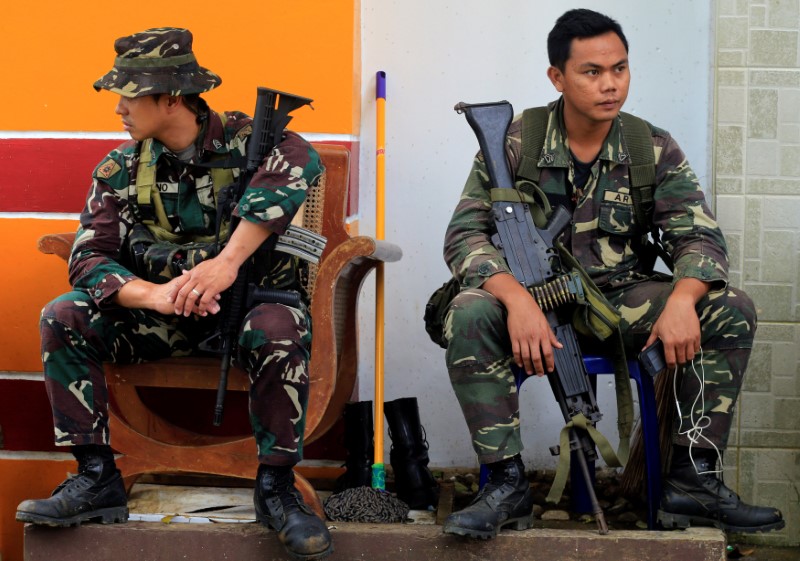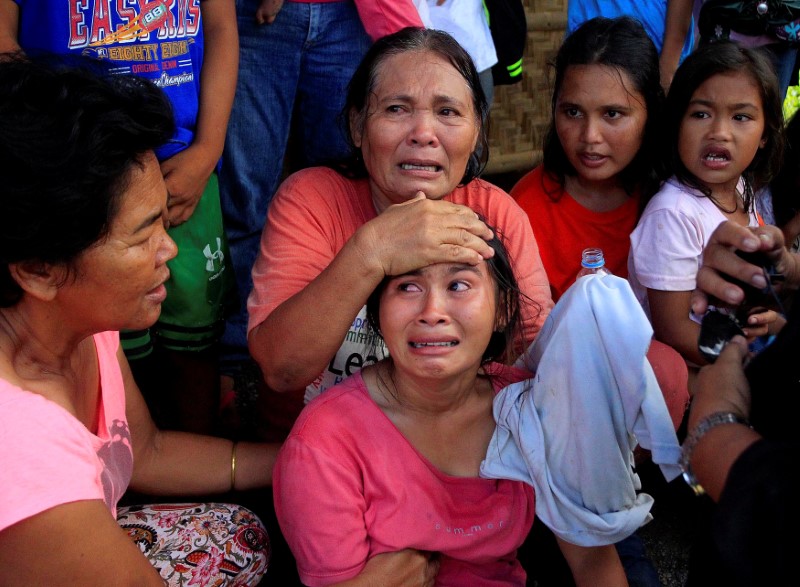
By Neil Jerome Morales and Manuel Mogato
MANILA/MARAWI CITY, Philippines (Reuters) – The Philippines, Indonesia and Malaysia agreed on Thursday to pool intelligence and tackle militant financing as fears grow that protracted fighting in a southern Philippine town could be the prelude to an Islamic State infiltration of the region.
Foreign ministers and defense officials of the three neighboring countries agreed to work together to share information, track communications and crack down on the flow of arms, fighters and money, amid what experts says is the biggest security threat facing Southeast Asia in decades.
Despite signs that the rebels battling government forces in Marawi City were on the back foot, authorities are worried that the fighting – now in its fifth week – might be the beginning of a wave of violence as the ultra-radical Islamic State group tries to establish a foothold.
Militants holed up in Marawi were cornered and their firepower was flagging, the military said on Thursday, estimating the number of remaining fighters at just over 100, and all within a 1 square kilometer area.
Malaysia Foreign Minister Anifah Aman told the meeting the that extremism needed an immediate response, and constant engagement between the three countries that must be a “cohesive unit”.
“This is an urgent task that we need to undertake as clearly evidenced through the current situation in Marawi,” he said.
“This means our enforcement agencies must constantly engage with one another, not only in intelligence sharing but new active and innovative measures.”
Indonesia, Malaysia and the Philippines have launched joint patrols to control militant movements across their archipelagic region.
But experts point to how they have previously failed to work together to prevent festering militancy and banditry from worsening, plagued as they are by mistrust, dormant territorial disputes and limited capabilities.
The Philippines in particular is widely seen as the weaker link.
Philippine Foreign Secretary Alan Peter Cayetano said Thursday’s meeting aimed to revisit existing security programs between the three and draw up a plan to strengthen and implement them.

Government soldiers take a break while guarding a city hall compound, as government troops continue their assault against insurgents from the Maute group, who have taken over parts of Marawi City, Philippines June 22, 2017. REUTERS/Romeo Ranoco
‘LOOKING FOR BASES’
His country was now a clear target for extremists, he said, and the region only needed to look at how quickly Islamic State, or ISIS, managed to recruit fighters and carve out strongholds in Iraq and Syria
“These jihadists will be looking for land bases or areas outside Iraq and Syria,” Cayetano told reporters.
“Everyone has their vulnerability, no one is perfect.
“If other countries have nationals in Marawi and Mindanao and are extremists, they are as much a threat to their home country as here.”
A Philippine officer, Lieutenant Colonel Christopher Tampus, said troops were blocking escape routes out of Marawi and rebels were hemmed-in and using civilians dressed in black as human shields.
“Our forces are coming from the east and the north and we are blocking the three bridges,” he said.
Tampus said the militant snipers were firing from “strategic nests” in schools and mosques, and their bombs were hampering his troops’ operations.
Malaysia is worried that militants could flee to its eastern state of Sabah.
Malaysia has a wanted list that includes two militants who spearheaded the attempt to capture Marawi.
They are a leader of the Abu Sayyaf group, Isnilon Hapilon, who was proclaimed by Islamic State last year as its “emir” of Southeast Asia, and Abdullah Maute, whose followers accounted for a large number of the estimated 400-500 fighters who overran parts of Marawi, killing Christians and taking dozens of civilians hostage.
According to official estimates, 369 people have been killed, three-quarters of them militants. The number of security forces and civilians killed stood at 67 and 26, respectively.

Residents who want to evacuate from their homes gather while waiting for a vehicle after Islamist militants, who had holed up in a primary school, retreated after a gunbattle with troops but were holding some civilians hostage, in Pigcawayan, North Cotabato, Philippines June 21, 2017. REUTERS/Marconi Navales
(Additional reporting by Simon Lewis in MARAWI, Karen Lema in MANILA, Rozanna Latiff in KUALA LUMPUR; Writing by John Chalmers and Martin Petty; Editing by Robert Birsel)









